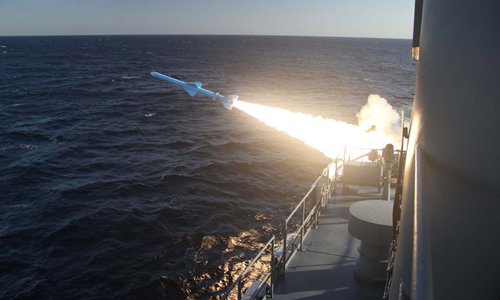HOME >> OPINION
US-promoted military escort alliance in Gulf another attempt to stymie Iran
By Liang Fang Source:Global Times Published: 2019/7/18 20:03:42

Iranian navy test fires ground-to-ship short-range cruise missile Ghader during an military drill on the Sea of Oman, southern Iran, 23 February 2019. Photo: IC
As US-Iran tensions continue, the fight for control of the Strait of Hormuz between the two countries is getting fiercer. General Joseph Dunford, US chairman of the Joint Chiefs of Staff, said in early July that the US is engaging with allies to form a coalition that would ensure freedom of navigation both in the Strait of Hormuz and the Bab el-Mandeb.
Iran reportedly is also considering a plan to collect tolls from foreign ships passing through the Strait of Hormuz, a scheme to compensate the country's efforts to ensure security in the strait. The waterway has become a powder keg that is triggering worldwide concern yet again.
There are three reasons for the US to enlist allies for a military coalition. The first is to exert maximum pressure on Iran. Although a complete oil embargo on Iran since May 2 has dealt a heavy blow to the Iranian economy, it has failed to completely halt Iran's oil exports.
Iran, for one thing, increased its enrichment of uranium in a strong response to US sanctions; for another, it has won the support of the EU over the nuclear deal. These have crippled the effectiveness of US sanctions. Under such circumstances, to escalate pressure on Iran is an inevitable move by the US.
The second is to turn the sanctions issue into an issue of freedom of navigation. The US oil embargo on Iran has caused great damage to the world energy market. The Strait of Hormuz is one of the most important oil trading passageways with interests of many nations converging. If a crisis occurs in the strait, it will seriously affect the world economy. Therefore, US allies including EU countries are reluctant to impose sanctions on Iran. Instead, the EU is creating a new payment system to allow European businesses to trade with Iran circumventing US sanctions.
By proposing a military alliance that ostensibly would safeguard the freedom of navigation, the US is attempting to make the issue more extensive and international to justify its sanctions.
The third is to promote the idea of a so-called Arab NATO. In September 2018, the US put forward a plan to establish a Middle East Security Alliance, something like an Arab NATO, to members of the Gulf Cooperation Council as a measure against Iran. Due to deep contradictions among some countries in the Gulf, it's hard to advance the plan. But the alleged Iranian attacks on two oil tankers has provided an opportunity for the US to promote the advancement of its "Arab NATO" idea.
The so-called military escort alliance is actually an alliance headed by the US with Gulf countries as major members that can restrain and deter Iran's military operations in the Strait of Hormuz. However, the US, in defiance of the role of the UN in the Middle East, will be hard pressed to achieve its goal.
First of all, few countries would respond to such a highly risky plan. US allies take a cautious attitude toward joining the military escort alliance. Judging by Britain's detention of an Iranian tanker in early July, the UK is ready to join the escort alliance, which can be viewed as a sign that the UK is in search of a new position in the post-Brexit world. Countries like Japan, Saudi Arabia and the United Arab Emirates are also likely to participate because of attacks on their merchant ships.
However, EU countries are cautious. France and Germany out of their own interests don't want to be enemies of Iran, nor are they willing to follow the US and increase sanctions against Iran which will intensify tensions in the region. The likelihood of them joining the alliance is slim.
Second, a military alliance without the authorization of the UN is not lawful. The US action to bypass the UN and form an escort coalition may result in new problems. Any actions taken by Washington such as monitoring, interception, boarding, inspection and detention in the Strait of Hormuz may be opposed by the international community.
An opinion piece by Russia Today said that the US was advocating "freedom of piracy" under the pretext of safeguarding "freedom of navigation."
Moreover, the US excessive reliance on force has intensified tensions among countries surrounding the strait. Navigation safety in the Strait of Hormuz has been maintained for over 30 years. Despite long-running conflicts, Gulf countries have ensured that the passageway remains open out of common interests. However, the US, as an external power, has repeatedly challenged the bottom line of security in the Middle East, increasing regional instability.
If the Strait of Hormuz becomes chaotic, so will the Gulf region and no country can emerge unscathed. Gulf countries should be wary of this: Blindly following the US will be disastrous for them.
The author is a professor with the College of National Security, PLA National Defense University. opinion@globaltimes.com.cn
Posted in: VIEWPOINT